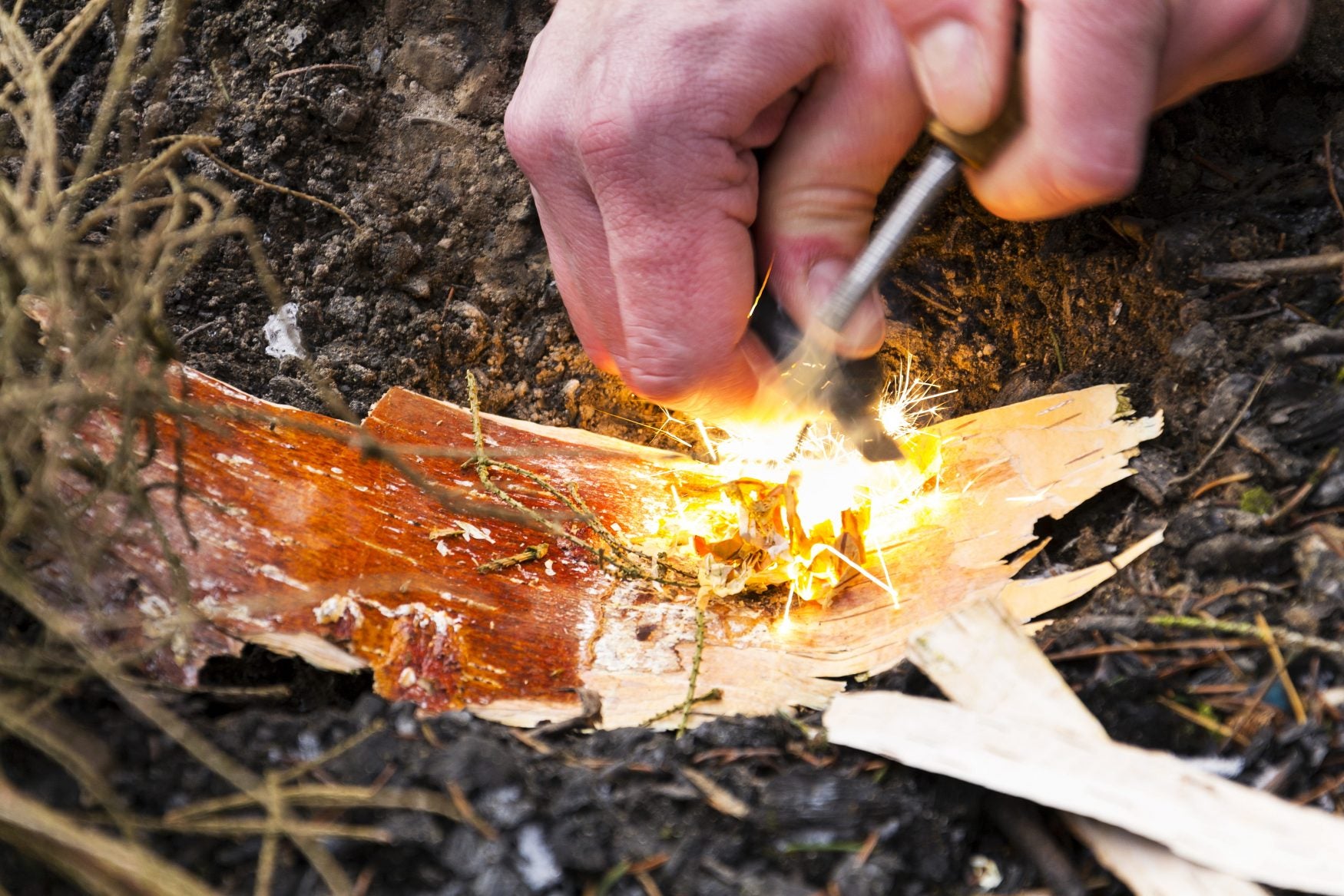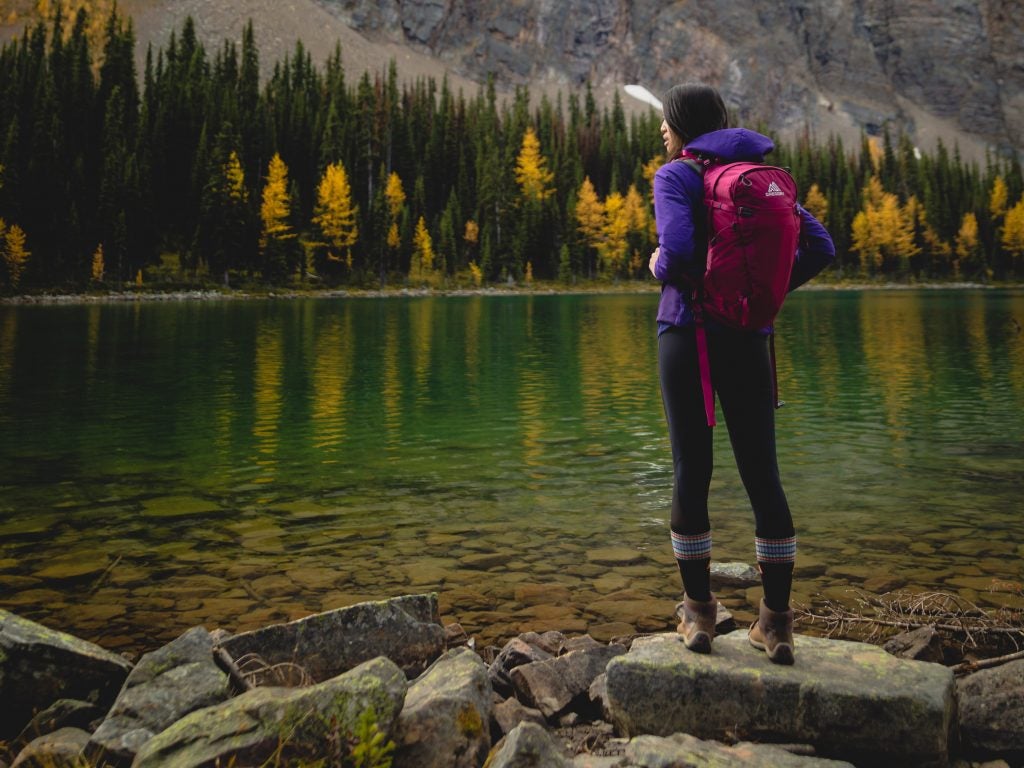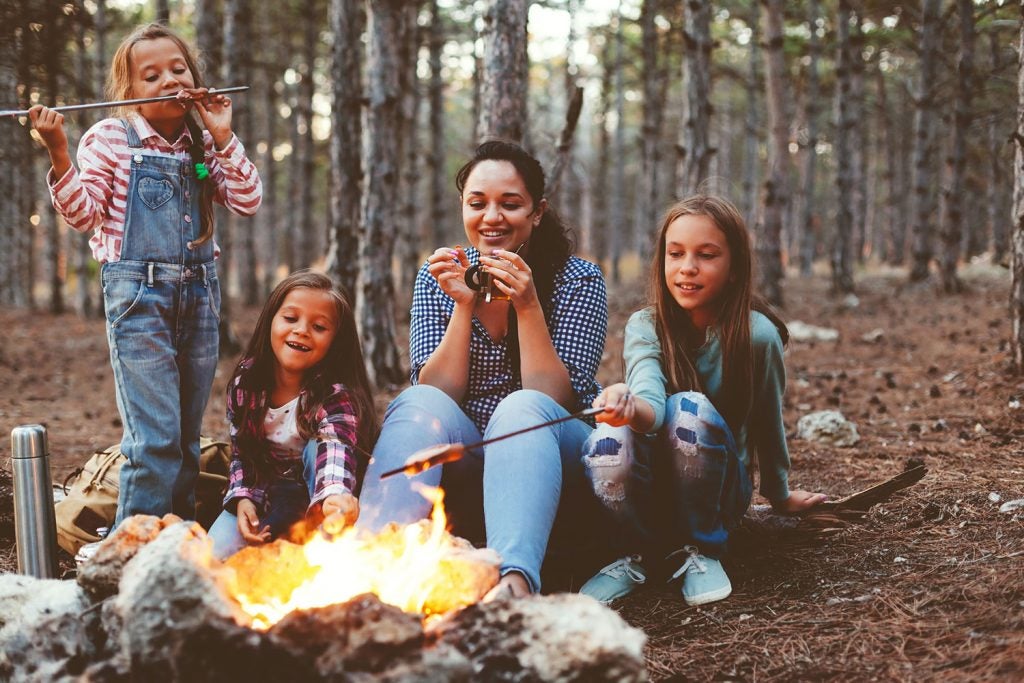For 60 years, Mountain House has been the go-to in emergency food storage and preparedness for backcountry trekkers and survivalists alike. Their freeze-dried food, from Lasagna with Meat Sauce to Cheesecake Bites, are fit for both survival situations and car camping. When travel hacks won’t cut it, Mountain House wants you to remember these essential survival skills for your backcountry adventures.
If you’ve spent any amount of time outside, you’ve probably learned how to build a fire or catch a fish. But what happens if you don’t have a fire starter or you forget your fishing pole? Knowing basic survival skills could help in a pinch, but these skills are also fun to learn when you’re spending a weekend in the woods.
Plus, you’ll have some fancy talents to show off next time you’re at the family campout or with friends in the backcountry. And you’ll be better prepared for that Zombie Apocalypse (thanks, Walking Dead).
Basic Survival Skills: Starting a Fire
There are a few basics to surviving in the wilderness and building a fire is one of them. The ability to keep yourself warm when the sun goes down and temperatures plummet near or below freezing, could make the difference between life and death (to be dramatic, and honest). We recently wrote an entire guide on how to build the perfect campfire, but what if you don’t have a fire starter?
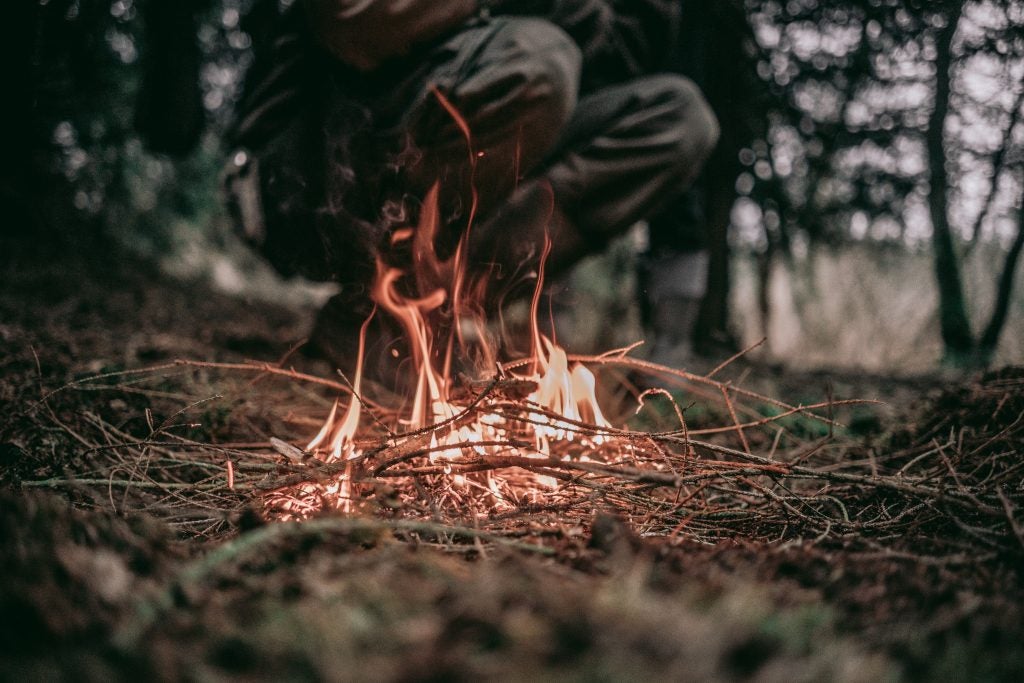
If you don’t have a lighter, you can pursue one of two options:
- Carry flint and steel with you. Where matches fail, flint and steel excels because despite how wet your flint becomes you can still make a spark. Make sure you’re aiming the flint sparks towards dry moss or lint, to get a flame, add oxygen, and then smaller pieces of tinder to light.
- Hand drill. One of the most primitive ways to start a fire, the hand drill requires grit, determination, and time. Find a dry plant stalk to be your drill. It should be about two feet long and 1/2″ in diameter. For the board, you’ll need a flat piece of wood that will remain steady as you begin to drill. Try to create a divot in the board where your drill will go and begin to spin the drill until it’s about 1/8″ deep. At that point, cut a 45-degree notch into the side of the board near the drill hole, and continue until you get a spark. Remember. Patience is a virtue.
Backcountry Essentials: Water Filtration
While we can all survive three weeks with minimal food, the human body, made up of 60% water, can only last three days without it. Knowing how to filter water without a filtration system can be useful for backcountry camping, and fun to learn at the campground, when you’re not in a dire situation. For basic, primitive water filtration you’ll need: a bottle, some kind of strainer (a thin shirt will do if that’s all you have), and a handful of natural materials like sand and rocks.
- Attach the shirt to the bottle so only a thin layer covers the mouth.
- Gather a handful of medium and small rocks, and a handful of sand.
- Layer the materials with the largest at the top and smallest near the mouth. Sand at the bottom, small rocks next, and larger rocks at the very top.
- Add water and allow it to slowly drip through the layers into a gathering pot.
- Boil water to eradicate any additional impurities.
Necessary Survival Skills: Navigation
Compasses are small, but mighty. Looking at the small device might trick you into thinking they’re easy to use, but the opposite is true. Thankfully, there are classes that can teach you backcountry essentials like how to use a map and compass in tandem.
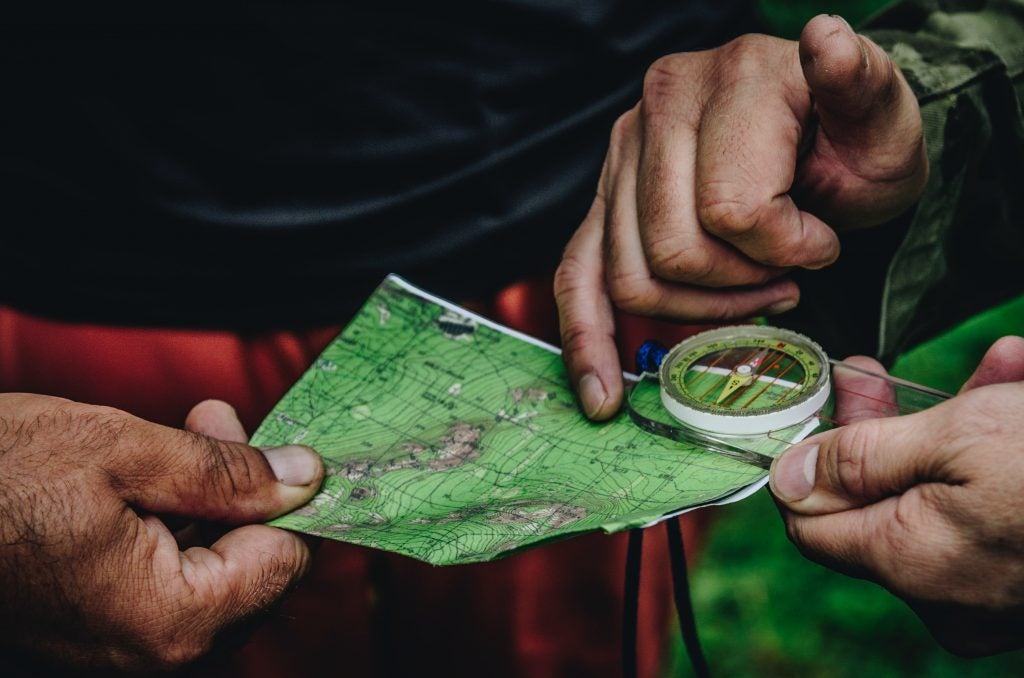
Image from Daniil Silantev on Unsplash
Once you’ve learned the basics, take to the woods and try out your newfound survival skills. Hike out on a trail you know and see if you can find yourself based on your map and compass reading. This is more than a survival tactic. It can lead you to places most will never go.
Hunger Help: Catching Fish
For centuries, we’ve caught fish without rods using spears or bare hands – and by “we” I am in no way referring to myself. While both of these methods are effective, there are two time-tested methods to catch fish: by rod and line, and a v-trap.
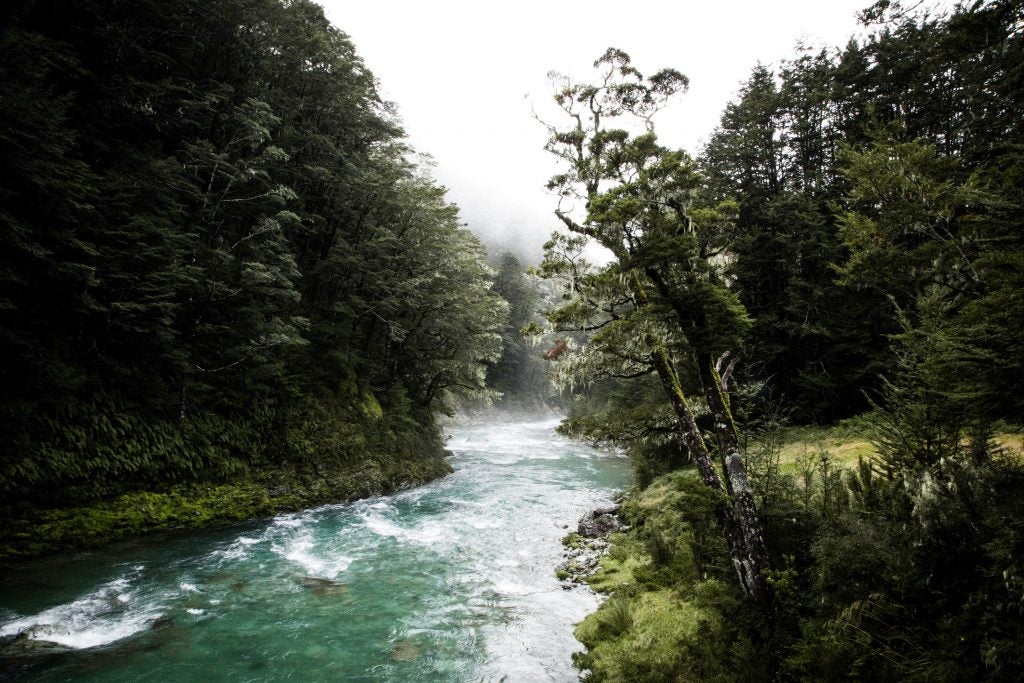
Image from Evan Clark on Unsplash
Improvised Rod
To create an improvised rod system you’ll need a stick for the rod, some kind of vine (or cordage if you have it), and a hook made from a soda tab, jewelry, or wood. Find a bug or even a piece of cloth to use as bait. A good rule of thumb is to keep fishing line and a lure in your pack at all times for the just-in-case.
V-Trap
If you’ll be in one place for a while, consider setting up a v-trap. Gather a few sticks and larger rocks to create the structure. You’ll want the “V” to aim upriver in order to catch the fish as they come downstream. This process can take a while, but if you’re patient, it will pay off.
Worth the Time: Building a Shelter
Building a shelter might be the easiest, but also the most time consuming survival skill on this list. However much time you think it’ll take to build a shelter, double it. The most basic and primitive shelter can take anywhere from 4-10 hours depending on the area and how many resources are available. Read up on how to build an a-frame structure, then try it out in the backcountry one weekend.
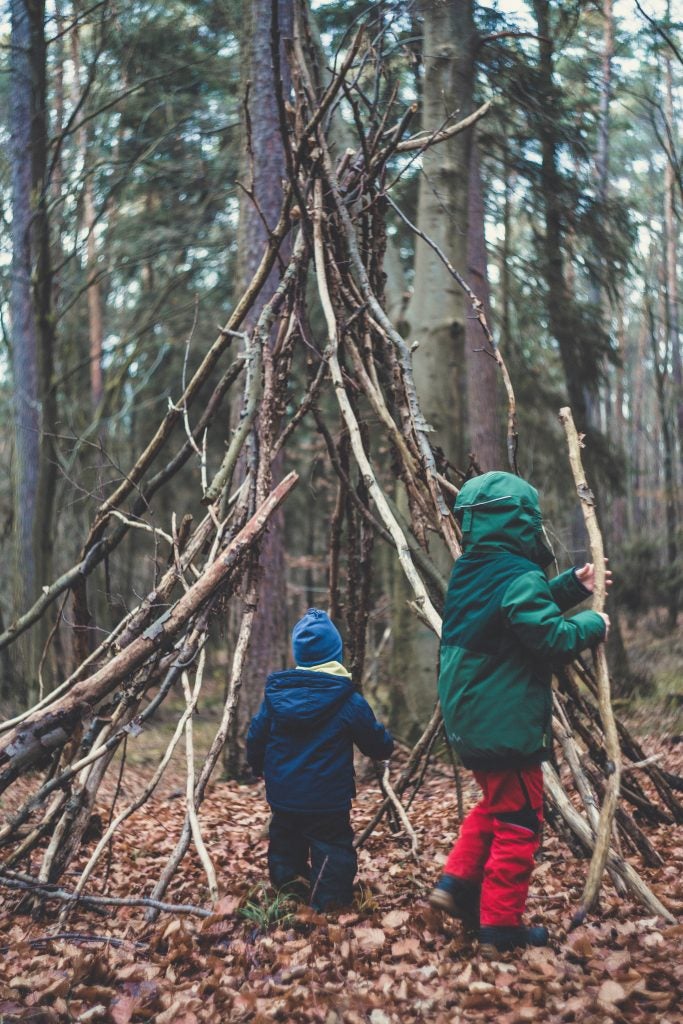
Image from Markus Spiske on Unsplash
- Find a sturdy log to be your lodgepole, or the spine of your shelter. You’ll want to lodge this between a fork in the branches on a sturdy tree.
- Gather sticks that are two to three feet long that you’ll lean against the spine of your shelter and place them against the lodgepole about 6″ apart.
- Cover the supporting sticks with mulch, grass, and full tree branches until the shelter is covered.
- If there’s time, build a bed with sticks and mulch 6″ off the ground for added warmth.
- Build a fire at the opening of your a-frame so the warm air drifts into your shelter.
There are countless shelter-building techniques to use in the backcountry, but this method has potential for standing room and provides room for a toasty campfire. No matter the approach, always remember to have a plan that gives you a chance to secure water, fire, food, and shelter before anything else. From there, these survival skills will keep you around for countless adventures to come.
Related Articles:
The Dyrt is the only camping app with all of the public and private campgrounds, RV parks, and free camping locations in the United States. Download now for iOS and Android.Popular Articles:
Articles on The Dyrt Magazine may contain links to affiliate websites. The Dyrt receives an affiliate commission for any purchases made by using such links at no additional cost to you the consumer.

